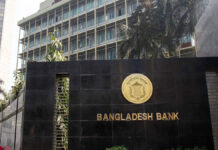‘We need a lot of resources, but without a lot of conditions’
Says Foreign Minister AK Abdul Momen at the closing ceremony of BDF

Bangladesh wants more assistance from the development partners for implementing its eighth five-year plan that begins from next fiscal year with the target of creating 1.05 crore jobs by 2025.
“We need a lot of resources, but without a lot of conditions,” said Foreign Minister AK Abdul Momen at the closing ceremony of the two-day Bangladesh Development Forum (BDF), a biennial gathering of development partners and government policymakers.
The meeting, organised by the Economic Relations Division (ERD), was held at a time when the country is striving to become a middle-income country by 2024. Once it graduates, the concessionary loans and trade privileges that it currently enjoys will dry up significantly.
Much of the discussions that took place in the two-day event centred on ways to meet the challenges then.
Eight sessions at the event included private sector engagement and trade facilitation; partnership for climate change and its financing; innovative financing for a self-reliant Bangladesh; rural transformation; health services, energy security; sustainable urbanisation, quality education and 4th Industrial Revolution.
The forum sought to deepen policy dialogue on key areas including addressing critical challenges in the 8th five-year plan and cooperation on strategic priorities; and thereby support to Bangladesh, according to a joint communique released after the event.
Bangladesh needs more resource mobilisation to achieve the Sustainable Development Goals by 2030 and become a developed nation by 2041, Momen said.
The country, which was once dubbed a bottomless basket, is now a vibrant economy, he said, adding that it is now facing a number of challenges, including development of infrastructure such as roads, bridges, railways and technology.
“We have huge manpower. We need to educate them and provide them with skills training, especially technical training,” Momen said, while urging the development partners to come up with affordable funds.
Bangladesh’s migrant workers are also an asset for the host countries. Development partners can come forward to help in this sector, too.
“Also, we need to do trade, but so much of protectionism won’t help. Development partners can help here.”
The implementation of projects in Bangladesh is a hard task. Besides, there are procedural problems for businesses, and the development partners can bring in expertise to help address these issues.
Momen also requested the development partners to live up to their own promises that they made to assist the developing countries. He floated the idea of creating a South-South Forum for finance and development, which can work for resources mobilisation.
“Bangladesh has a bright future,” said Finance Minister AHM Mustafa Kamal, who chaired the concluding session.
At least 41 recommendations were from the meeting and the government will implement those over the next five years.
The government is aiming to reduce poverty from existing 17.2 per cent to 12.1 per cent by 2025. It is also targeting to bring down the ultra-poverty rate from 8.37 per cent to 5.28 per cent.
For the goals to be achieved, the government has set a goal of achieving 8.51 per cent GDP growth and investment 37.2 per cent of GDP, he said.
The growth would be achieved by implementing the mega projects and establishing an industry- and business-friendly tax-regime.
At the same time, the government also wants to increase the revenue to 15 per cent of GDP. At present, Bangladesh’s tax to GDP ratio is below 10 per cent of GDP, which is considered one of the lowest in the region, Kamal added.
The government will require Tk 7,741,800 crore in investment over the next five years to help materialise its plans, said Shamsul Alam, member of Bangladesh Planning Commission.
About 75 per cent of the sum will come from the private sector.
The country’s gross domestic product (GDP) growth rate will hit 8.23 per cent in fiscal 2020-21, the first year of the plan, and will further increase up to 8.51 per cent in fiscal 2024-25, he said on the first day of BDF.
Effective partnership between the development partners and Bangladesh is imperative for achieving the SDGs that speak of leaving none behind, said Prime Minister’s Economic Adviser Mashiur Rahman.
“We want to work in a way to accelerate our growth and equitable development,” he added.
ERD Secretary Monowar Ahmed they have been able to create new areas of cooperation through the discussions around the challenges being faced by the development of Bangladesh.
“We want cooperation from our development partners,” he said.
UN Resident Coordinator Mia Seppo said the development partners want to support the next five-year plan and continue the discussions on gender equality, governance structure, SDGs and economic equality.
MAKE CITIES INCLUSIVE
At a session on urbanisation, speakers said nearly 50 per cent of Bangladesh’s population is expected to live in cities by 2030.
Subsequently, they called for making city development more inclusive.
Attaining the SDG goal 11, which talks of sustainable cities and communities, would be impossible by 2030 without partnership between all stakeholders: the government, development practitioners, private sector and citizens, said SM Rezaul Karim, housing and public works minister.
Sudipto Mukerjee, United Nations Development Programme (UNDP) resident representative in Bangladesh, pointed out that the slum-dwellers keep the cities running.
“They are actually the people doing all the menial jobs that otherwise no one else would be doing.”
He called for learning more about the slum dwellers and their needs and their involvement in city planning exercises.
Angelika Fleddermann, head of German International Cooperation (GIZ), called for integrated urban planning involving the private sector and especially the vulnerable residents in the planning process.
“The cities have to be made more resilient to climate change. It is becoming a, bigger and bigger issue here,” she said.









